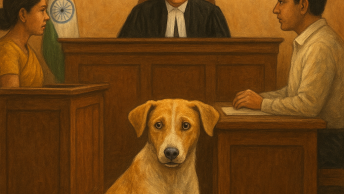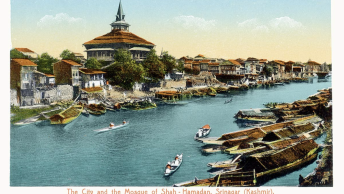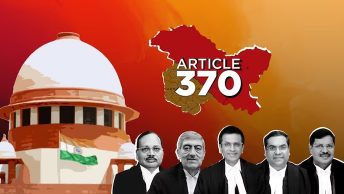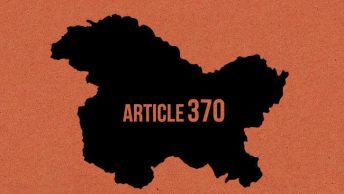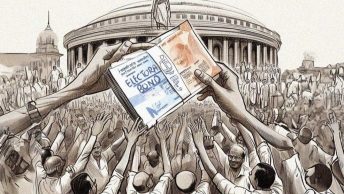On Day 3 of the hearings in ‘In Re: Article 370 petitions’, Sheikh Abdullah, Brexit, the UK, and Executive Power dominated the discussion in the petitions pertaining to the revocation of Article 370. As Sr Adv Kapil Sibal concluded his arguments today, he raised fierce arguments against the executive action of the government and the interpretation of the powers of the Governor.
When the Bench was convened today morning, the judges noted how long submissions create issues when compiling judgments. As Mr. Kapil Sibal, Sr Adv, started his arguments with a wish to submit speeches made in the J&K Constituent Assembly,which, he said, were not part of the original submission, Justice Kaul objected to it, citing the violation of the equality clause if others were not allowed to do the same. Mr. Sibal said that he was not adding anything new to the submissions.
Sheikh Abdullah and the Dream of a Nation
Mr. Sibal then referred to Sheikh Abdullah’s speech laying down the purpose of the J&K Constituent Assembly. The address he referred to was made on November 5, 1951, in which Abdullah reminded the members of the significance of the day “which comes only once in the life of a nation.”(emphasis supplied) He told the members that
“[A]fter centuries we have reached the harbour of our freedom, a freedom, which for the first time in the history, will enable the people of Jammu & Kashmir, whose duly elected representative[sic] are gathered here, to shape the future of their country after wise deliberation, and would their future organs of the Government.”(emphasis supplied)
However, Mr. Sibal sets the following part of Sheikh Abdullah’s speech as a background for the question of the plebiscite and the temporary nature of the provision:
“When the raiders were fast approaching Srinagar, we could think of only one way to save the state from total annihilation-by asking for help from a friendly neighbor. The representative of the National Conference, therefore, flew to Delhi to seek help from the Government of India. But the absence of any constitutional ties between our State of India made it impossible for her to render us any effective assistance in meeting the aggressor. As I said earlier, India had refused to sign a Stand Still Agreement with the State from the ground that he could not accept such an Agreement until it had the approval of the people. But now, since the people’s representatives themselves sought an alliance, the Government of India showed readiness to accept it. Legally the Instrument of Accession had to be signed by the ruler of the State. This the Maharaja did. While accepting that accession, the Government of India said that she wished that “as soon as law and order have been restored in the Kashmir and her soil cleared of the Invader, the question of the states[sic] accession should be settled by reference of the people.” (Emphasis supplied)
Referring to the speech, CJI Chandrachud spoke about the importance of accession with India and the land reforms which took place in J&Kr. Reference was also made to Pakistan, which continued with feudalism and would not have served the interests of Abdullah. Mr. Sibal then spoke about the Constitution as settling the will of the people. The people of J&K gave themselves their Constitution, said Sibal, just as the people of India gave themselves Indian Constitution.
CJI saw great merit in the reasoning of Abdullah’s statement. He read the understanding of Abdullah with respect to Pakistan, which says that the natural recourse for J&K was to join Pakistan, but that would not serve the ambitions of Abdullah and was not convincing enough for what he felt for J&K and its people. CJI, then continued reading Abdullah’s speech.
The Executive Act
Mr. Sibal turned to the executive action of the government. He argued that an executive act cannot decimate the Constitution or change a legislative assembly to a constituent assembly. He refers to Mir Qasim’s statement in the Constituent Assembly (Refer to page 645 on the attached link). A unilateral executive decision cannot change the terms of a relationship constitutionally embedded in Article 370, says Mr. Sibal. Article 370 mentions the Instrument of Accession and concurrent list. It does not make a mention of the residuary powers of the state. Thus, an executive act cannot unilaterally alter the provisions of the Constitution of India as applicable to J&K. This extends to the ‘special status’ in the form of 370.
Justice Kaul asks whether it was an executive act. Mr. Sibal says that Articles 356 and 367 are executive, as these changes had already been done when Parliament came into the picture. The Parliament accorded approval to executive actions.
Brexit
Mr. Sibal brought the attention of the judges to Brexit. Sibal reminds the judges that since there was no constitutional provision seeking a referendum, people’s opinion was necessary. CJI then said that in the case of constitutional democracy, people’s decision has to be established through democratic institutions. He said there cannot be a referendum like Brexit as the Constitution does not discuss it. CJI queried whether the Constitution entrusts the Government with such an authority. Mr. Sibal said that the Union of India cannot terminate a relationship in the manner they did. CJI questioned whether the Constituent Assembly has said something about clause (3) of Article 370. Mr. Sibal said that the Constituent Assembly could have terminated the essence of Article 370, which they did not.
Constitutional Act and Morality
CJI Chandrachud asked whether the mere proceedings of the Constituent Assembly or a constitutional amendment required under the Indian Constitution could have converted the temporary provision into a permanent provision. Mr. Sibal said that the Government of India has always had a consistent view of this. CJI explained that there are two ways through which it can be understood- one, though placed in Part XXI, Article 370 was never intended to be temporary; two, though temporary, the reason it was placed in Part XXI was pending the decision of Constituent Assembly of J&K. He then asked if a parliamentary intervention was required to convert the provision into a permanent one.
Can Article 368 amend Article 370?
Justice Khanna asked whether Article 368 can even amend Article 370. CJI said that once it is assumed that Parliament can, any amendment of Article 370 would be subject to criticism on morality but not power. (Emphasis supplied) Mr. Sibal said that on this subject, even a bill cannot be initiated as it comes on the recommendation of the Constituent Assembly. It would also mean redrafting the substantive part of clause (3) to postulate that the power under clause (3) can be exercised as long as the Constituent Assembly exists.Mr. Sibal then said that once Parliament incorporated the provision of the Constituent Assembly, it must have happened in collaboration with Jammu and Kashmir. He says J&K would not have a Constitution if Article 370 were to be abrogated.
Governor’s Powers and a Constitutional Myth
Mr. Sibal referred to the Constitution (Application to Jammu and Kashmir) Order, 2019, and doubted whether the Governor can be said to be “acting on the advice of the Council of Ministers” when there is no such Council. Mr. Sibal called the act of assuming that there is a Council of Ministers when there is no Council of Ministers a constitutional myth. This is followed by a presidential order where also Governor is acting on the aid and advice of the Council of Ministers, which is fictitious. Mr. Sibal registered that such political exercises do not happen in constitutional democracies. Mr. Sibal rightly said that it is the exercise of executive power, not constitutional power. Mr. Sibal referred to Brexit again, stating that Boris Johnson’s actions of bypassing the Parliament and requesting the Queen to prorogue the House were deemed illegal by the UK Supreme Court. He also said that the crisis at hand was worse.
CJI wondered why it was crucial to amend Article 367 to abrogate Article 370. He supposes that if it is happening plainly within the fold of Article 356, all powers vested in the J&K executive would be transferred to the Government. To this, Mr. Sibal says that the power under Article 356 cannot be exercised independently of Article 367. Mr. Sibal replied to CJI’s query that if the Article 367 amendment is disregarded, Article 356 cannot be exercised. Mr. Sibal says that executive orders cannot change constitutional provisions when CJI said that the government proceeded with the hypothesis of replacing the constituent assembly with the legislative assembly when they felt that the consultation was necessary.
Interpretation and Ambiguity
When the Bench was reconvened post lunch, Mr. Sibal reminded the judges that historical context should be considered when interpreting these orders. He noted that an interpretation more consistent with our constitutional values, namely, representative democracy, federalism, and constitutional morality, should be preferred, ensuring the harmonious functioning of the Constitution. The power under 356 doesn’t extend to making non-restorative changes to the State’s constitutional status. The actions done under Article 356 are contrary to the principles of federalism and democracy, and constitutional morality. Similarly, Article 3 cannot be used to efface the character of a State. Constitutional change cannot thus happen without consultation with the people of J&K.
The Supreme Court’s Judgments on Article 370
Mr. Sibal then referred the Bench to a series of Supreme Court judgments, which are being reproduced below:
Prem Nath Koul v. State of J&K (1959)
Sampat Prakash v. State of J&K (1968)
Maqbool Damnoo v State of Jammu and Kashmir (1972)
Mr. Sibal argued that the position of the Supreme Court of India in the judgments above has been that the ‘special status’ granted to Jammu and Kashmir in terms of Article 370 cannot be taken away without the concurrence of the people of Jammu and Kashmir. Mr. Sibal also said that changing the term ‘Sadar-e-Riyasat’ to ‘Governor’ was a mere change of nomenclature, which is an incorrect view according to the author of this piece. Sadar-e-Riyasat was an elected position and was to be elected by the State Legislature. Replacing the Sadar-e-Riyasat with a Governor, a central appointee, meant that it was not just a change of nomenclature but a significant alteration in the constitutional framework. (To understand the Supreme Court’s position on Article 370 critically, readers are directed here.)
The Bench rose for the day.
Aurif Muzafar is a doctoral fellow at NALSAR. He is also a Research Associate for the MK Nambyar SAARC Law Center, NALSAR.
[Ed Note: This piece is part of our series covering the hearing on the abrogation of Article 370. This post has been edited by Archita Satish and posted by Harshitha Adari from our Student Editorial Team]


